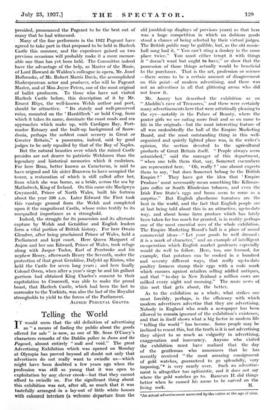Telling the World
TT would seem that the old definition of advertising -11- as " a means of fooling the public about the goods offered for sale " is now, as one of Mr. Sean O'Casey's characters remarks of the Dublin police in Juno and the Paycock, almost entirely " null and void." The great Advertising Exhibition which was opened on Monday at Olympia has proved beyond all doubt not only that advertisers do not really want to swindle us—which might have been doubted a few years ago when the profession was still so young that it was open to exploitation by any, clever crook—but that they cannot afford to swindle us. For the significant thing about this exhibition was not, after all, so much that it was tastefully arranged -in a -lay-out of little white houses with coloured interiors (a welcome departure from the old jumbled-up-displays of previous years) as that here was a huge competition in which no dubious goods stood a chance of being selected by their virtual judges. The British public may be gullible, but as the old music- hall song had it, " You can't sting a donkey in the same place twice." You must either tempt it with things it " doesn't want but ought to have," or show that the possession of those things actually would be beneficial to the purchaser. That is the art, profession or science —there seems to be a certain amount of disagreement on this point—of modern advertising, and there was not an advertiser in all that glittering arena who did not know it.
Mr. Amery has described the exhibition as an " Aladdin's cave of Treasures," and there were certainly many advertisements here that were artistically pleasing to the eye—notably in the Palace of Beauty, where the poster girls we see eating more fruit and so on came to life in the - originals—but the most interesting feature of all was undoubtedly the hall of the Empire Marketing Board, and the most outstanding thing in this well- organized and quietly lighted place was, in the writer's opinion, the section devoted to the agricultural products of Great Britain itself. " People always seem astonished," said the manager of this department, " when one tells them that, say, Somerset cucumbers are represented here. ' Oh, really ? ' one almost expects them to say, but does Somerset belong to the British Empire ? ' They have got the idea that Empire Produce' .must necessarily mean something like Kiliman- jaro coffee or South Rhodesian tobacco, and even the Irish Free State's eggs and hams seem to come as a surprise." But English glasshouse tomatoes arc the best in the world, and the fact that English people arc at last being told about this in an attractive, up-to-date way, and about home farm produce which has lately been taken far too much for granted, is in reality perhaps one of the most essential uses of the whole exhibition. The Empire Marketing Board's hall is a place of sound Commercial ideas—" Let your goods be well dressed : it is a mark of character," and an example of intelligent co-operation which English market gardeners especially would do well to follow. Here, too, one learned, for example, that potatoes can be cooked in a hundred and seventy different ways, that really up-to-date poultry farmers stamp their eggs with a code mark which ensures against retailers selling addled antiques, and that " to-day in New Zealand a million cows are milked every night and morning." The more news of this sort that gets, about, the better.
As to the exhibition as a whole, what strikes one most forcibly, perhaps, is the efficiency with which modern advertisers advertise that they are advertising.
Nobody in 'England who reads a newspaper has been allowed to remain ignorant of the exhibition's existence, and that in itself shows what a big factor in modern life " telling the world " has become. Some people may be inclined to resent this, but the truth is it is not advertising they object to so much as vulgarity in advertising, exaggeration and inaccuracy. Anyone who visited the exhibition must have realized that the day of the gentleman who announces that he has recently received " the most amazing consignment of gold watches, guaranteed • to go splendidly, very imposing,"* is very nearly over. Such an advertise- ment is altogether too optimistic, and it does not say where the gold watches go to. Rameses II. did things better when he caused his name to be carved on the An actual advertisement answered by the writer at the age of nine.






















































 Previous page
Previous page